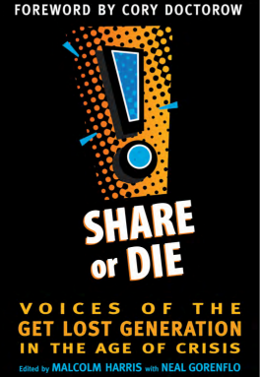Share or Die is a new book edited by Neil Gorenflo, of The Abundance League and Shareable magazine. It is a set of stories about modern life in a stagnant economy and various ways the rising generation is creatively adapting with methods that build community and repel corporate deadening.
Cory Doctorow starts off by noting that while the press is full of panic stories about how the Internet isolates us and makes us shun human contact in return for “likes” and “pokes” and “tweets,” they may have missed the story in which people chose more social, conversational, sharing models of Internet behavior (a la Facebook) over the old broadcast model where corporations delivered content and spectators passively took in what they were delivered.
The Internet has not necessarily made us more detached and more mediated. We are more enabled to share, more often, and in more ways than ever. Some people use the Internet as a way of avoiding social contact, but other people are using it as a way of augmenting and optimizing it.
Samantha Miller shares her insights into “activist nonprofits” that straddle the line between within-the-system advocacy and confronting-the-system activism, by telling stories from her work with CodePink. Among her insights:
The organizations that make up the anti-war movement are an especially sad breed because they have no sense of strategy. They operate on the notion that if there are enough protests and media stories, politicians will feel pressured to end the wars. Successful activist nonprofits, like many in the environmental movement, identify achievable goals, target power-holders and develop strategies to win better conditions for people’s lives. After eight years of war in Iraq and almost ten in Afghanistan, the anti-war movement has just recently started to think about strategies and campaigns to actually end the wars.
“Nine” tells of a life as a perpetual nomad, living out of a backpack and making ends meet on a 25-year (and counting) world tour. Hannah Brencher talks about life as an unpaid volunteer in New York City, how she made herself useful by inventing a position the folks she was volunteering for didn’t even know enough about to define. Ryan Gleason writes of living off of the detritus (and low-end jobs listings) of Craigslist. Venessa Miemis writes about how haphazard but earnest social media participation can almost unwittingly build mutually-rewarding, inventive community:
Here are three big insights I’ve had these past few years…
- Your community already exists and is waiting for you.
- Your vision already exists — it is a shared one.
- The tools of empowerment already exist and are ready to be wielded.
The pieces you need really are there; they’re just often hard to recognize.
Tom Judd writes of “organizing the precariat” — workers on the margin who don’t feel they have the leverage to organize and fight for better treatment, and some of the lessons learned along the way.
Mira Luna, whom we were lucky enough to have speak at the Oakland/Berkeley NWTRCC national gathering, contributes two articles: one on how to start and operate a worker co-op and another on how to build a housing co-op.
Beth Buczynski writes about “collaborative consumption” and what it takes to get from here to there, including many links to the new tools that help make it possible:
Together, we’re learning that instead of waiting for politicians and corporations to fix the system, it’s possible to create a better one of our own, right under their noses — a new way of living, in which access is valued over ownership, experience is valued over material possessions, and “mine” becomes “ours” so everyone’s needs are met without waste.
Arianna Davolos writes about “the stranger,” the one we were always warned about as children, but whom we need to reintroduce ourselves to as adults. She started holding potlucks of strangers as a way of seeding peoples’ lives with curious introductions and otherwise unlikely connections, and she gives you the game plan for how to plan a Stranger Dinner of your own.
Melissa Welter writes about her attempts to lower her food budget, brought on initially by health issues but becoming more of an issue of food and budget awareness. Milicent Johnson discusses resilient Detroit. “Detroit,” she says, “in a lot of ways, parallels the track we are on as a nation.” And that’s not as bad as it sounds.
“Robin” writes of a guest house in Amsterdam that hosts a constant turnover of nomads, and how that dynamic works. Eric Meltzer writes about bypassing universities and getting a more practical education. Willie Osterweil covers the Indignants movement in Spain and the Occupy movement in New York and thinks about what makes for an effective movement in the modern era.
Finally Neal Gorenflo & Jeremy Adam Smith write about Sharing as a paradigm that defines our age.
Gen Y is a hero generation, coming of age in a time of crisis they’re already helping to resolve, largely by applying the tools and mindset of sharing.

